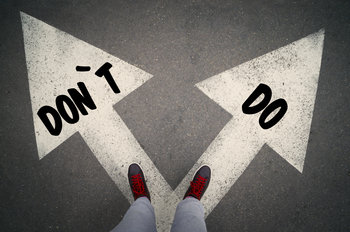 To kick off the busy spring home buying season, HSH.com is presenting a series of articles entitled "Preparing to buy a home." This article is the first in the series and covers saving for your down payment and mortgage expenses; other articles cover some of the do's and don'ts when buying a home and a deeper look at the true cost of homeownership.
To kick off the busy spring home buying season, HSH.com is presenting a series of articles entitled "Preparing to buy a home." This article is the first in the series and covers saving for your down payment and mortgage expenses; other articles cover some of the do's and don'ts when buying a home and a deeper look at the true cost of homeownership.
For many, coming up with a down payment is the biggest obstacle to home ownership. Those with low-to-moderate incomes may be eligible for down payment assistance through various community agencies or charitable groups, and eligible home buyers have access to U.S. Department of Agriculture (USDA) or Veterans Affairs (VA) home loans that don't require a down payment. But if you don't qualify for down payment assistance programs or zero-down home loans, you'll have to come up with a down payment another way.
How much down payment will I need?
Your down payment, if you finance your purchase with an Federal Housing Administration (FHA) loan, has to be at least 3.5% of the purchase price (as long as your credit score isn't lower than 580). So if you want to purchase a $250,000 home, you need to come up with $8,750. You must also consider closing costs. Plan on paying 2%-3% of the purchase price to fund your mortgage, pay your property taxes and insurance and cover your portion of title insurance and escrow fees. That's another $5,000 to $7,500. Finally, it's a good idea to have an emergency fund set aside to cover your house payment for at least two months. Underwriters call this fund your "reserves," and it makes your application a lot more attractive to lenders.
So, you have a purchase price of $250,000, a loan amount of $241,250 and an upfront FHA mortgage insurance premium of 1.75%, for a total of $245,471.88. Using one of HSH.com's mortgage calculators, you can see that at a mortgage rate of 4.25%, your mortgage payment is $1,207.57, plus taxes and insurance. If we assume those are about $275 a month, you may need just under $3,000 to cover two month's worth of payments. Even for a 3.5% down FHA home loan, you'd need to have saved up about $17,000, and that's if closing costs are only 2 percent of the loan amount!
Options from Fannie Mae and Freddie Mac may allow you to put just 3% down, but the math won't be much different.
Reduce Closing Costs
One way to reduce down payment and mortgage expenses is to get the seller to cover some or all of your closing costs. After all, whether the seller drops the sale price 3% or covers closing costs of 3%, the results are nearly the same to him or her (the commission is based on the sales price, however, if he or she covers costs instead of lowering the sales price, that expense is only slightly bigger). A full-price offer with closing cost concessions may make more sense for a cash-strapped buyer than a reduction in sales price. The FHA allows seller concessions of 3%, and if they are willing, you may be able to use this leverage to your advantage.
Let's say you're able to negotiate this 3% concession for closing costs from the seller. Now that you've got your savings goal down to $12,000; create a plan for saving that sum.
It may be possible to further reduce this figure, depending on your choices for paying costs and fees. Allocating limited funds to the best possible effect across required down payment, points and closing costs can be tricky, but this Downpayment Decisioner tool can help.
Related: What's the true cost of owning a house?
How to save for a down payment while renting
If your proposed mortgage payment is $1,208 plus $275 for taxes and insurance, or $1,483 per month, and your rent is $1,000 a month, you know you'll be paying $483 a month more once you buy your home. Can you handle it? Before you buy, see if you are ready to handle the increased expense. Try putting that additional $483 a month into a special account for your home. After a few months, evaluate your success. Have you been able to put all that money aside? Have you been able to avoid increasing your debt? (It's not really savings if your credit card balances go up.) Have you been able to keep your hands off that account? If not, you may need to choose a cheaper house with a lower monthly payment, but it's better to find that out now. Assuming that you can save the $483 a month, and if you can earn 1% interest on your savings, it may take you about 25 months to save $12,075.
This plan accomplishes three things:
You save money toward your down payment.
You get to test-drive your proposed mortgage payment to see how comfortable you are with the added expense.
If you don't have an extensive credit history, underwriters are allowed to consider regular additions to a savings account as a monthly obligation that you have honored successfully. Doing so makes your credit look better.
Save for a downpayment on a house fast
Can you speed up the savings timetable? Maybe, but it will take effort. Below is a list of ideas to help you think creatively about saving for a downpayment on a house fast:
Sell some belongings. Are you storing rarely-used exercise equipment, musical instruments, unused china sets, old computers or more? List them on Facebook Marketplace, EBay, Craigslist, LetGo or a hold a garage sale. You may want new furniture when you get your new house anyway, so sell what you don't need now to make that day come sooner -- plus there should be less stuff to move!
Cancel unused subscriptions. Many things are offered on a subscription basis today and signing up is usually only a few clicks or an app download away. You may have accumulated more of these than you remember, especially for non-physical services, like streaming entertainment or satellite radio. Every $10 per month subscription you can cancel means a small step further toward your goal, and trimming $83 per month means another $1,000 in savings over the next year.
Part-time work. Dedicate some free time to an income-generating part-time job, such as freelancing, tutoring, dog walking, house-sitting, child care or on-demand gig work.
Carpool. Are you a couple owning two cars? Try selling one and carpooling for a year. Put the proceeds or the saved car payment funds toward your down payment.
Cut entertainment costs. Eat at home more, spend more time at the gym and less time out on the town -- figure out what your biggest money-drains are and which ones you can cut out or minimize. If you pay for utilities each month, lower your thermostat setting in winter and raise it a bit in summer to save a few bucks.
Earn more on your money. If your funds are parked in a low- or no-interest checking or savings account, scan offerings for high-yield money market accounts and help your savings earn more. $50,000 earning 1% nets you just $500 over a 12-month period, but 4% will return $2,000 -- it's like saving an additional $29 a week with no additional effort.
How can I get help with my down payment for a house?
Parents and other relatives may be able to help you come up with needed funds, too. If saving for (another) year before jumping into the market means you'll miss a chance at a great house and perhaps some strong price appreciation, it can be worth it to ask if family members can make a gift to you. Under IRS rules, a gift can be as much as $19,000 per person without triggering any tax implications. This means that if your parents have the means, they could gift you as much as $38,000 -- and gifts don't all have to come in large amounts from a single source. However, all gifts used as funds for your mortgage must be documented as gifts, so make sure to get gift letters (preferably notarized) from each donor.
As we mentioned in the beginning of this article, there may also be state or local downpayment assistance programs available to you. Some of these programs have income limits; others have geographic restrictions. However, some are available to other folks such as teachers, police, firefighters and veterans. Some programs are low- or no-interest loans, others outright grants. Even if you are eligible for them, don't expect these offers to fall into your lap -- you'll need to go out and investigate what's available.
Start your plan now. In the next year or so -- perhaps sooner -- establish great savings habits, enhance your credit rating, research any assistance that might help you along and enjoy the satisfaction of striving toward a worthy goal: a home of your own. Saving money for your downpayment isn't likely to be easy or fast, but be diligent and determined and you may get to your goal sooner than you think.
Related: For some, no-downpayment mortgages do exist
Keith Gumbinger contributed to and updated this article.



